Near and Far is a column about public issues and cultural affairs.
Would you like a job with a starting salary of $182,600 and one of the most generous benefit/pension plans in the world? You’d probably have to travel a fair amount if you get the job but your employer will ensure you always fly business class (after the pandemic of course).
Oddly, somewhere between 30 and 40 per cent of your interview committee won’t show up for your final interview.
Given the salary and benefits, would you be surprised to know that you don’t have to have any qualifications in particular to apply for the job? And would you be further surprised that, generally, no one will check your work to see if you are being effective for four years? And actually – you may never accomplish much of anything in your job.
But that does not mean you will be fired. In fact, once you get the job, it is likely you will keep it for as long as you want (the mystical power of incumbency).
What strange and wonderful job is that, you ask? You’ve probably already guessed what it is – yes, member of parliament (MP).
As we roll on into the second year of a terrifying pandemic with no clear end in sight, many writers and thinkers have suggested a multidimensional crisis like the one we all now share is a rare opportunity to revisit and fundamentally question – well – everything. What a good idea. And our political system is definitely deserving of naked scrutiny and generative alternatives.
While many Canadians are proud of our democracy, the sad truth is that millions of us never participate in it. The last provincial election in BC – one of the recent spate of pandemic elections – saw 54 per cent of eligible voters cast a ballot. The BC NDP’s strategists knew that would happen and they also knew they would emerge victorious from a cynical political exercise.
Here in Powell River, not quite 45 per cent of eligible voters cast a ballot in municipal elections in a non-pandemic year. Federal elections see 60-per-cent-plus participation, generally. In other words, millions of Canadians see so little value, inspiration or relevance in the people and systems that govern us that they have nothing to do with politics.
How did we get here? And does who we elect and how we elect them have anything to do with the profound disconnect at the heart of our political system?
There is something wonderfully democratic in the idea that literally anyone can seek to become a member of parliament. And the results of this “come one, come all” dynamic bear uneven results.
While there are 338 members of parliament, the reality is that only about 10 per cent of those MPs (those in cabinet) have much to do with the choices made on our behalf and the running of government. The remaining 300 or so MPs are relegated to well paid bit parts, on the distant margins of majority governments and shooting stars with brief turns in the firmament during periods of minority governments.
Should all MPs and prospective members of parliament have to demonstrate core competency across a wide range of subject areas before or after they are elected? And if they are not sufficiently competent, should they be required to follow comprehensive courses of study so they can participate in public discourse with intelligence and wisdom?
Should we have term limits for members of parliament so they don’t become overly attached to their generous salaries and so that time in parliament is seen as a relatively brief honour rather than as a cozy career choice?
As we lurch toward a federal election that no one but the prime minister wants (weak opposition on the Liberals’ left and right is a great temptation it seems), we should perhaps be asking ourselves and our members of parliament these and other questions.
~ John Young


